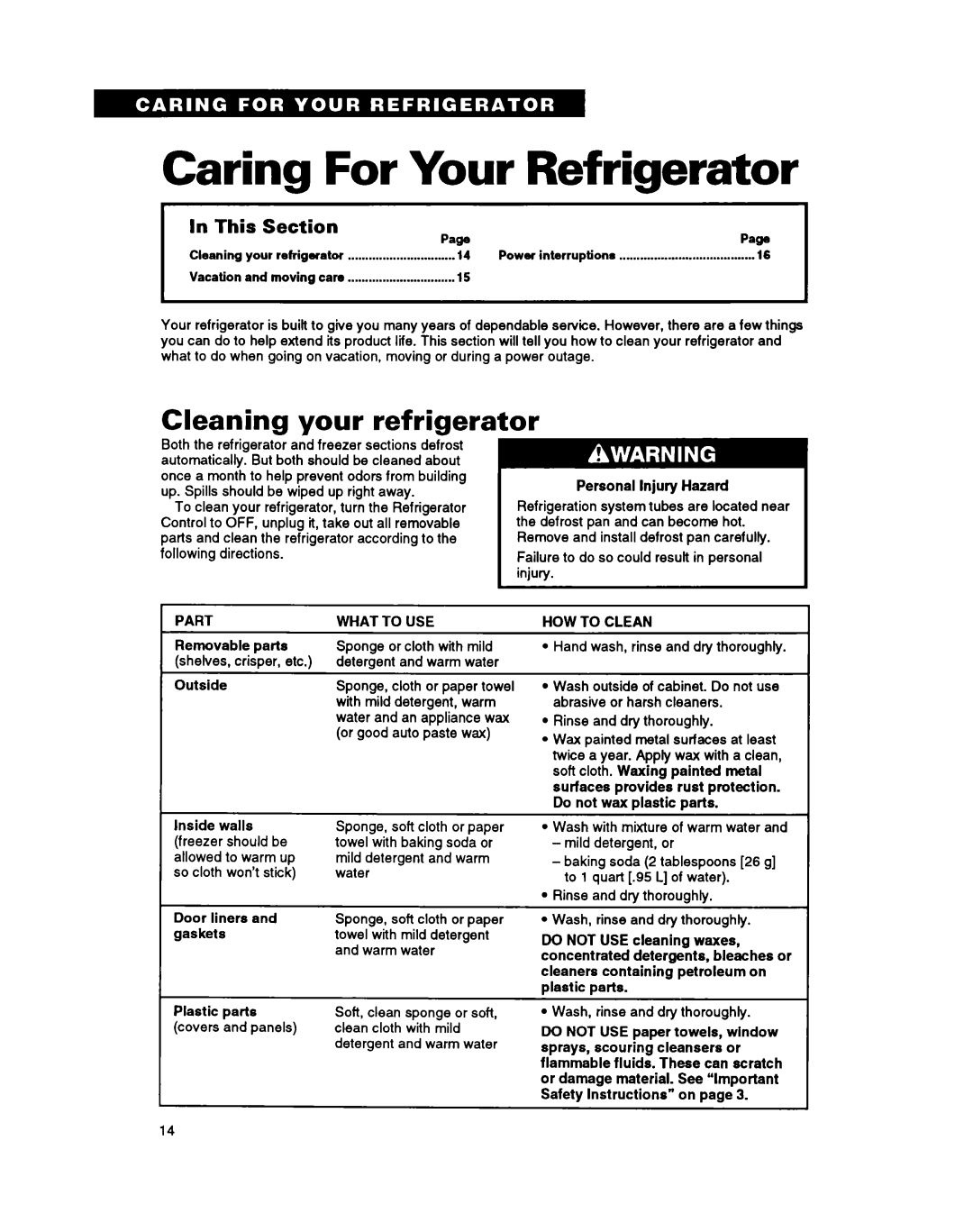
Caring For Your Refrigerator
In This Section
PagePaw
Cleaning your refrigerator ............................... 14 Power interruptions ....................................... 16 Vacation and moving care ............................... 15
Your refrigerator is buik to give you many years of dependable service. you can do to help extend its product life. This section will tell you how what to do when going on vacation, moving or during a power outage.
However, there are a few things to clean your refrigerator and
Cleaning |
| your |
| refrigerator |
|
|
|
|
|
|
|
|
| |||||||
Both the refrigerator aid freezer sections defrost |
|
|
|
|
|
|
|
|
|
|
| |||||||||
automatically. But both should be cleaned about |
|
|
|
|
|
|
|
|
|
|
| |||||||||
once a month to help prevent odors from building |
| r |
| Personal | Injury Hazard | |||||||||||||||
up. Spills should be wiped up right away. |
|
|
| |||||||||||||||||
|
|
|
|
| system | tubes | are | located near | ||||||||||||
To clean | your | refrigerator, | turn the | Refrigerator |
|
| Refrigeration |
| ||||||||||||
Control | to OFF, | unplug it, take | out | all | removable |
|
| the defrost | pan and | can | become | hot. | ||||||||
parts and | clean | the | refrigerator | according | to the |
|
| Remove | and | install | defrost | pan | carefully. | |||||||
following | directions. |
|
|
|
|
|
|
|
| Failure to | do so could result | in personal | ||||||||
|
|
|
|
|
|
|
|
|
|
|
| injury. |
|
|
|
|
|
|
|
|
|
|
|
|
| WHAT | TO USE |
|
|
|
|
|
| ||||||||
|
|
|
|
|
|
|
|
|
|
|
| HOW | TO | CLEAN |
|
|
|
| ||
Removable parts |
| Sponge | or cloth with | mild | l | Hand | wash, rinse | and | dry thoroughly. | |||||||||||
[shelves, | crisper, | etc.) | detergent | and | warm | water |
|
|
|
|
|
|
|
|
| |||||
Outside |
|
|
| Sponge, | cloth | or paper | towel | l | Wash | outside | of cabinet. | Do not use | ||||||||
|
|
|
|
| with mild | detergent, | warm |
| abrasive | or harsh | cleaners. | |||||||||
|
|
|
|
| water | and an appliance | wax | l | Rinse | and dry | thoroughly. |
| ||||||||
|
|
|
|
| (or good auto paste wax) | l Wax painted metal surfaces at least | ||||||||||||||
|
|
|
|
|
|
|
|
|
|
|
| |||||||||
|
|
|
|
|
|
|
|
|
|
|
|
| twice a year. Apply wax with a clean, | |||||||
|
|
|
|
|
|
|
|
|
|
|
|
| soft cloth. Waxing painted metal | |||||||
|
|
|
|
|
|
|
|
|
|
|
|
| surfaces | provides | rust protection. | |||||
|
|
|
|
|
|
|
|
|
|
|
|
| Do not wax plastic parts. |
| ||||||
Inside walls lfreezer should be sllowed to warm up so cloth won’t stick)
Door liners and gaskets
Sponge, soft cloth or paper towel with baking soda or mild detergent and warm water
Sponge, soft cloth or paper towel with mild detergent and warm water
l Wash with mixture of warm water and - mild detergent, or
lRinse and dry thoroughly.
l Wash, rinse and dry thoroughly.
DO NOT USE cleaning waxes, concentrated detergents, bleaches or cleaners containing petroleum on plastic parts.
Plastic | parts | Soft, | clean | sponge | or soft, |
(covers | and panels) | clean | cloth | with mild | |
|
| detergent | and warm | water | |
l Wash, rinse and dry thoroughly.
DO NOT USE paper towels, window sprays, scouring cleansers or flammable fluids. These can scratch or damage material. See “Important Safety Instructions” on page 3.
